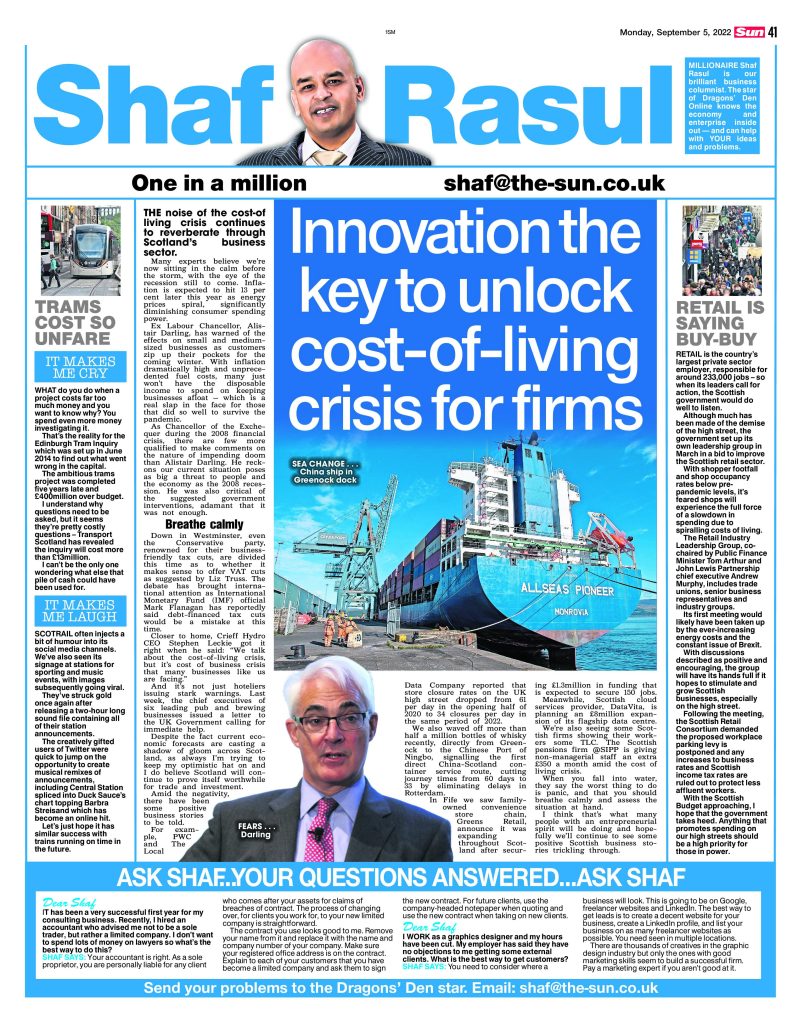The noise of the cost-of living crisis continues to reverberate through Scotland’s business sector. Many experts believe we’re now sitting in the calm before the storm, with the eye of the recession still to come. Inflation is expected to hit 13 per cent later this year as energy prices spiral, significantly diminishing consumer spending power.
Ex-Tory Chancellor, Alistair Darling, has warned of the effects on small and medium sized businesses as customers zip up their pockets for the coming winter. With inflation dramatically high and unprecedented fuel costs, many just won’t have the disposable income to spend on keeping businesses afloat – which is a real slap in the face for those that did so well to survive the pandemic.
As Chancellor of the Exchequer during the 2008 financial crisis, there are few more qualified to comment than Darling. He reckons our current situation poses as big a threat to people and the economy as the 2008 recession. He was also critical of the suggested government interventions, adamant that it was not enough.
Down in Westminster, even the Conservative Party – renowned for business-friendly tax cuts – are divided as to whether VAT cuts proposed by Liz Truss are a sound move. The IMF has warned that debt-financed tax cuts could be a mistake.
Closer to home, Crieff Hydro CEO Stephen Leckie was spot on when he said, “We talk about the cost-of-living crisis, but it’s a cost of business crisis that many businesses like us are facing”.
And it’s not just hoteliers issuing stark warnings. Chief executives from six major pub and brewing companies have written to the UK Government pleading for immediate help.
Despite the bleak forecasts, I’m still holding on to cautious optimism. Scotland has long shown resilience and ingenuity in tough times. There are still positive business stories making the rounds.
PWC and The Local Data Company reported that daily store closures on the UK high street have slowed from 61 in early 2020 to 34 in 2022.
We also saw a major export milestone: over 500,000 bottles of whisky recently left Greenock for the Chinese port of Ningbo in the first ever direct container service between Scotland and China, cutting journey times nearly in half.
Greens Retail, a Fife-based convenience store chain, announced expansion plans after securing £1.3 million in funding – a move expected to create 150 jobs.
Cloud services provider DataVita is planning an £8 million expansion of its flagship data centre, and Scottish pensions firm @SIPP is offering an extra £350 per month to non-managerial staff during the crisis.
They say necessity is the mother of invention – and the pandemic already proved Scottish firms are more than capable of adapting.
Like staying calm in deep water, business owners must resist panic, assess their situation, and keep innovating. If they do, I’m confident we’ll continue seeing stories of resilience and growth breaking through the clouds.
Retail Recovery Must Remain a Government Priority
Scotland’s retail sector is the nation’s largest private employer, supporting around 233,000 jobs. When its leaders speak, the Scottish Government would be wise to listen.
There’s been talk for years about the ‘death of the high street’, but the Government clearly sees its importance, having set up a dedicated Leadership Group in March to support retail recovery.
With shopper footfall and occupancy rates still lagging below pre-pandemic levels, there’s fear the ongoing cost-of-living crisis will hit the sector hard just as it was getting back on its feet.
Co-chaired by Public Finance Minister Tom Arthur and John Lewis executive Andrew Murphy, the Retail Industry Leadership Group (RILG) includes senior business reps and unions. Their challenge now includes inflation, energy prices, and Brexit fallout.
The Scottish Retail Consortium wasted no time after the group’s first meeting, calling for the workplace parking levy to be shelved and opposing hikes to business rates and income tax.
Let’s hope the upcoming Scottish Budget reflects those urgent calls. High street survival is no longer a talking point – it’s a necessity.
It Made Me Laugh
Scotrail Remix Goes Viral
Successful businesses often inject some personality into their public presence – whether through customer service, social media, or quirky campaigns.
Scotrail’s sense of humour has already won fans with witty signage and station messages – but they’ve really struck a chord now.
Their latest stunt? A two-hour audio file compiling every station announcement in their system. Naturally, social media pounced on the chance to get creative.
One viral remix blended the word “Central Station” into Duck Sauce’s chart hit Barbra Streisand – and it’s been racking up views.
Let’s hope their trains run as smoothly as their marketing team does.
It Made Me Weep
Tram Inquiry Costs Spiral Like Tracks
What do you do when a project runs wildly over budget? In Edinburgh’s case, you spend even more money figuring out why.
The infamous Edinburgh Tram Inquiry, launched back in June 2014, was meant to uncover how the capital’s tram project ended up £400 million over budget and five years late.
Now Transport Scotland confirms the inquiry itself has cost over £13 million – and still isn’t wrapped up.
While it’s important to seek accountability, many will be asking: what else could that £13 million have gone toward during a national cost-of-living emergency?


